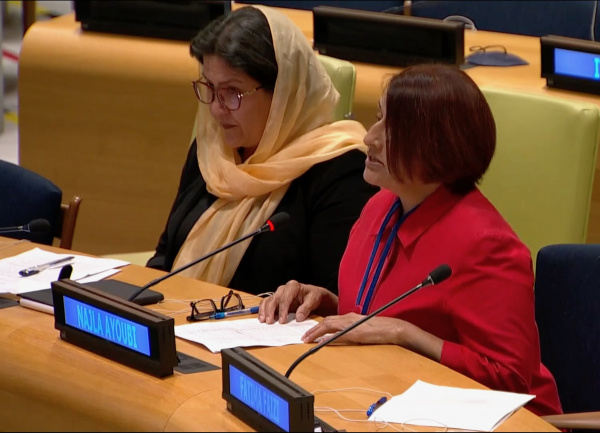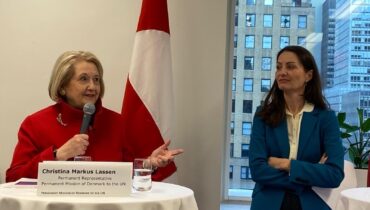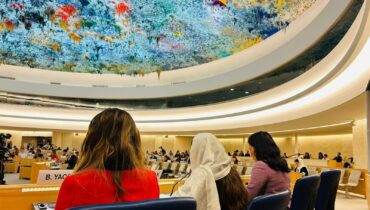When the Taliban took Kabul in August 2021, thousands of Afghans fled for their lives. GIWPS played a central role in evacuating high-risk Afghan women leaders, including women’s rights activists, journalists, policymakers, and public officials. None wanted to leave, but staying would have meant arrests, reprisals, and even death at the hands of the Taliban.
Today, over 100 evacuated Afghan women leaders make up the Onward for Afghan Women network. Onward for Afghan Women was conceived to support the dignified resettlement of these women and to enable them to continue advocating on behalf of Afghan women and girls.
“We wanted to leverage our own contacts across the policy world to amplify the voices of these incredible leaders,” said Allie Smith, the director of Onward for Afghan Women. “We can’t let the voices of Afghan women leaders be lost while the Taliban oversees a spiraling human rights and security catastrophe. Afghan women must still be at the table.”
Since the fall of 2021, GIWPS has organized 10 high-level events that featured prominent Afghan women experts and connected them with American and international policymakers.
“Look at that recent success which GIWPS had a big role in: helping Afghan women to impact significantly on the Security Council,” said Mary Robinson, former president of Ireland and chair of The Elders, during the GIWPS-hosted CSW66 side event on women’s role in climate-related conflict. “It was their voices, their urgency, their passion, which made a difference. That’s what we’re talking about: when women can get to the table, the difference it will make.”
PROTECTING AFGHANS’ HUMAN RIGHTS AT THE UNITED NATIONS
Members of Onward for Afghan Women played a key role in extending the United Nations Assistance Mission in Afghanistan (UNAMA) in March.
With UNAMA’s mandate about to expire and Afghanistan facing a dire human rights crisis, GIWPS partnered with UN Women and several member-states to organize a high-level event at the United Nations to serve as a platform for Afghan women leaders to push for a stronger mission that protects and advances human rights.
“We need UNAMA,” explained Judge Najila Ayoubi in her remarks to UN representatives. “It can serve a documenting, investigating, fact-finding role for the rule of law and women’s access to justice.” A lawyer and former judge who played a leading role in the drafting of Afghanistan’s constitution, Ayoubi now advocates for Afghan women’s rights through her work at Every Woman Treaty.

Judge Najila Ayoubi speaks at a high-level event at the United Nations on March 15, 2022, urging the Security Council to renew the mandate for the UN Assistance Mission in Afghanistan with an emphasis on the rule of law and women’s access to justice.
Ayoubi was joined by Horia Mosadiq, the founder and director of an Afghan human rights organization, Fatima Faizi, a New York Times reporter in Afghanistan, and Yalda Royan, an international development professional and women’s rights activist.
GIWPS compiled a set of policy recommendations from Afghan women leaders and shared them with members of the UN Security Council. A number of the Afghan leaders’ proposals were incorporated in the drafting process of the new UNAMA mandate, including a stronger emphasis on protecting the rights of women, girls, ethnic minorities, and human rights defenders.
The Security Council voted to renew the mandate on March 16, 2022 with an added focus on human rights monitoring, humanitarian assistance, and participation of women and girls in Afghan society.
“I am very glad that [the Council] made references to human rights, women’s rights, and International Humanitarian Law,” Mosadiq said afterward. “I hope UNAMA is given the political and financial support to independently and impartially monitor, investigate and report on human rights violations in Afghanistan.”
PUSHING TO GET AFGHAN GIRLS BACK IN THE CLASSROOM
Around the same time, the Taliban shuttered girls’ secondary schools just hours after reopening them for the first time in seven months. Citing their desire to ensure that schools comply with “Sharia law and Afghan tradition,” the Taliban’s ministry of education broke its promise to return girls above 6th grade to the classroom.
Although the move elicited strong global condemnation, real consequences for the Taliban were in short supply.
Wanting to drive a forceful policy response, Afghan education experts in GIWPS’ Onward for Afghan Women network sprang into action.
Within days, GIWPS published two white papers on girls’ education in Afghanistan to help inform the international response to this brazen violation of women’s rights.
The white papers contain recommendations for safeguarding girls’ education, sources of leverage the U.S. can use against the Taliban, and alternative education mechanisms to help Afghan girls continue learning. They also challenge the Taliban-perpetuated myth that girls’ education goes against Islamic teachings.
In addition, GIWPS organized a Congressional briefing to give Afghan women experts a platform for advocating directly to senior legislative staff in the House and Senate. Drawing on their expertise in politics, public policy, and education, Afghan leaders proposed strategies for ensuring education access for Afghan women and girls. Briefers included former Afghanistan Member of Parliament Naheed Farid and two GIWPS fellows — Roya Rahmani, former Afghan ambassador to the United States, and Palwasha Hassan, director of the Afghan Women’s Educational Center.
Following this successful event, congressional offices continue to reach out to GIWPS seeking further expertise on Afghanistan’s education crisis. Hill staffers regularly attend GIWPS-organized events on the situation in Afghanistan, drawing on Onward leaders as a key resource for informed policy decisions.
“These women dedicated their careers in Afghanistan to advancing women’s rights and developing effective programs.” Smith noted. “Now that they’re here, they can and should be a key resource for U.S. foreign policy.”
ADVISING THE BIDEN ADMINISTRATION ON EFFECTIVE AID DISTRIBUTION
More than 23 million Afghans face acute hunger, and the country is experiencing a near-total collapse of public services. Western donors, international NGOs, and the UN have set up mechanisms to distribute humanitarian aid to Afghans while circumventing the Taliban. However, women-led civil society groups, critical to delivering aid to Afghan women, are largely missing from the conversation.
“The exclusion of women’s groups with decades of experience in development and human rights is a critical oversight,” Smith said. “And it’s exactly what the Taliban wants.”
In April, GIWPS organized a briefing for U.S. government officials as a platform for Afghan women activists and civil society representatives to stress the critical role of women’s groups in providing effective humanitarian assistance.
“Women-led organizations are the voice of the people of Afghanistan,” Mary Akrami, Executive Director of the Afghan Women’s Network (AWN), told U.S. officials attending the briefing. “We have to create a trust fund for on-the-ground organizations, and we must come up with ways to support [them].”
Briefings by Afghan experts that tackle various aspects of the humanitarian and political crises are extremely valuable to U.S. policymakers.
“There is real interest from policymakers in what these experts have to say,” Smith said. “I get messages from people at the State Department or USAID: ‘Do you have someone who can talk to me about the Afghan Central Bank?’ ‘Is there someone who can help me refute this argument the Taliban is making?’ It’s been an honor to connect these women with opportunities to help their country.”
CHARTING A PATH FORWARD FOR EXILED AFGHAN WOMEN
With exiled Afghan women leaders spread across the United States, many are now exploring opportunities to advocate and provide policy counsel to their new representatives in Congress.
In April, GIWPS connected a member of the Onward for Afghan Women network with her member of Congress, Rep. Jim Banks of Indiana. The leader met with Rep. Banks’ foreign policy advisor for more than an hour and discussed a range of issues facing Afghanistan, including recent terrorist attacks on members of the Hazara ethnic group.
GIWPS also hosted a U.S. advocacy training for members of the Onward for Afghan Women network during a retreat in Washington, DC in April and is now equipping leaders with training resources and contact information to facilitate their continued advocacy.
“Don’t count these women out,” Smith said. “They may have lost their homes and careers in Afghanistan last summer, but they are passionate about building a brighter future for the next generation of Afghan women and girls.”


